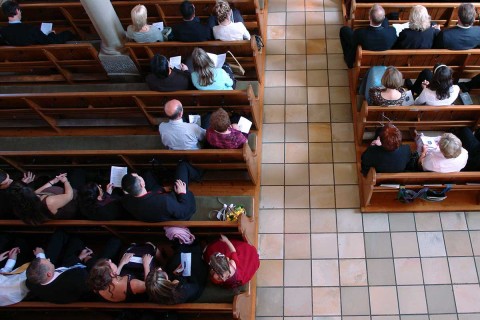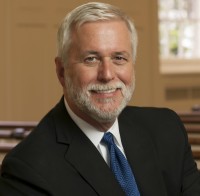A glimpse of how heaven sees worship
On World Communion Day, I sat in the balcony. The view was stunning.

I sat in the side balcony of our local church for the World Communion Sunday service. This is where I worship with my wife when I am not on the road serving the seminary. We chose the balcony when our sons were teenagers, as part of a deal we made in order to get them to worship. But after they went to college Dawne and I continued to head up to the balcony. It makes us feel closer to our sons, and it offers the best leg room in the sanctuary.
It also offers a great view of the congregation. During the distribution of the communion elements I found myself focused not on prayer, as I should have been, but on those in the pews below. I don’t know them as well as I would if I were their pastor. But over the years of sitting in that balcony, I’ve come to recognize many of their faces. I can even see the lines on them.
Read our latest issue or browse back issues.
There are the young parents who can’t wait for the children’s time in the liturgy, when their kids will be invited beyond the doors of the sanctuary into someone else’s hands for the rest of the hour. Sitting nearby are exhausted professionals, students, teachers, shopkeepers, secretaries, and those who thought retirement would be a lot less stressful than it is. They all find their way into the pews in hopes of encountering something that will restore their souls which have been flattened down by another hard week. A few of them probably just got bad news from a physician, or a boss, or a spouse. All of them got bad news from the newspapers. More than once over the years I have noticed an older woman start coming to worship alone when she used to be accompanied by her husband.
Others have had a wonderful week after something like the wedding of a child, the birth of a grandchild, or a 50th anniversary party. They had to come to church to stand among others who know that all of life is a grace.
Most of those in the pews probably had a week that was neither great nor horrible, but they’ve learned that nothing can make us more blind to the presence of the Holy Spirit than the ordinary. These worshipers don’t feel broken or particularly blessed, but they find their lives centered in saying an old creed, singing a hymn so familiar they barely need the hymnal, reciting the Lord’s Prayer, and hearing a sermon that treats God’s Word and human words seriously. They just want to know that grace can also appear in the routine.
The pastor of this congregation is an incredible preacher, but if all these people I saw during communion wanted was his thoughtful sermons, they could have stayed home and read them online. They gave up a precious Sunday morning and came to church because they needed to sit beside people they may not know any better than I do in a house of worship, which is already a sacramental experience. Their souls beckoned or maybe dragged them to church that morning. Or possibly their spouse’s or parent’s soul got them there. But from the balcony I could see them gathered as a part of a flawed community in search of a taste of grace. They didn’t want to just read about it later.
Since it was World Communion Sunday, I paid particular attention to people from different places than I’m from. The guests who helped lead the worship service were from Malawi, the pastor at the table was a woman from Norway, and those I knew from our seminary community were very far from their home in another country. We sang songs in three different languages. Last year on this Sunday I watched the pastor walk up and down the aisle asking those whose first language was not English to say a piece of the liturgy in their own mother tongue. From the balcony I got a glimpse of how heaven sees worship every Sunday.
When I can’t sit beside my wife in worship, it’s because I’m a guest preacher at another church. The host pastor never lets me sit in the balcony. But even from the perspective of the chancel, I am impressed by seeing people in church who could only have come because their souls brought them.
This is the secret to understanding the persevering health of the church amid the narrative of decline. Churches are not healthy because they’re sufficiently growing, diverse, or making a profound impact on their communities. Some are doing these things and some are not. But all of them are healthy because when even two or three come together in the name of Jesus Christ, he is in their midst. And where Christ is present the most miraculous things are possible.
I wish I could get every pastor up to the balcony to see that.
-----
A final note: Over the course of the past ten years I have written 65 Faith Matters columns. I am very grateful to the editors for giving me a long run. They asked me to continue, but I have decided it is time to give my place in this column to another voice from the church. Thank you for letting me be a part of a team of authors who regularly try to demonstrate how faith matters.
A version of this article appears in the print edition under the title “Why church matters.”







